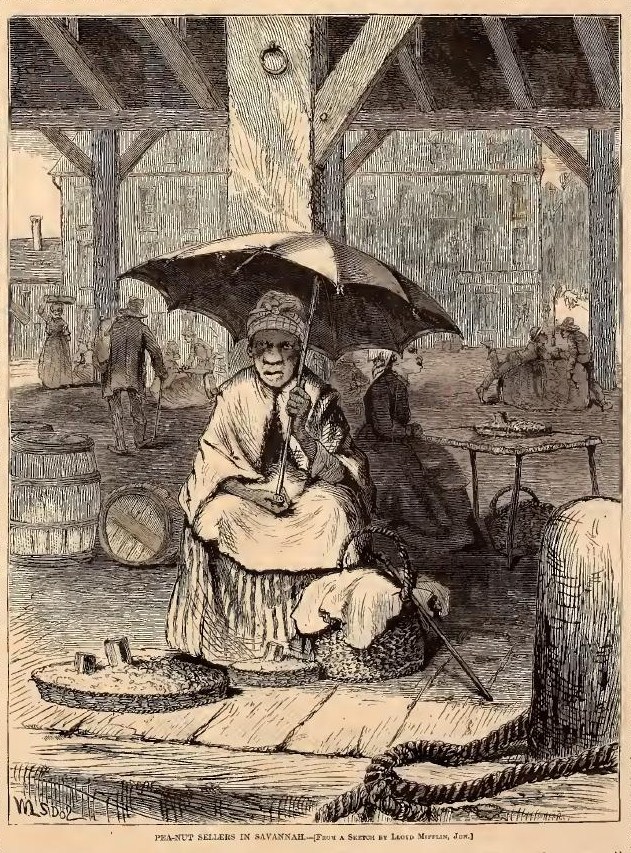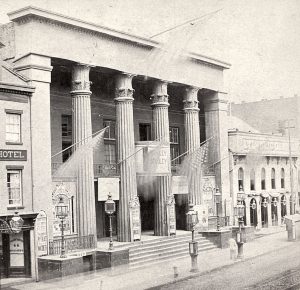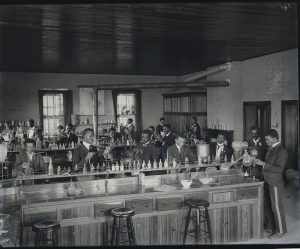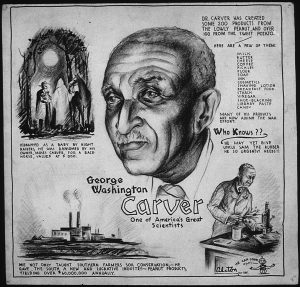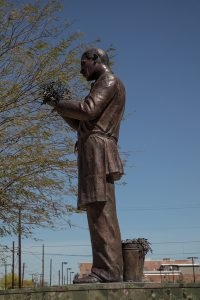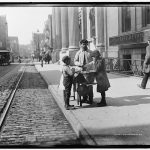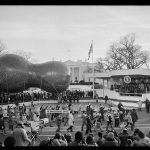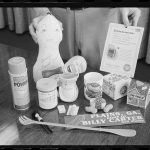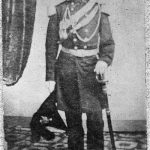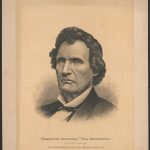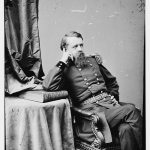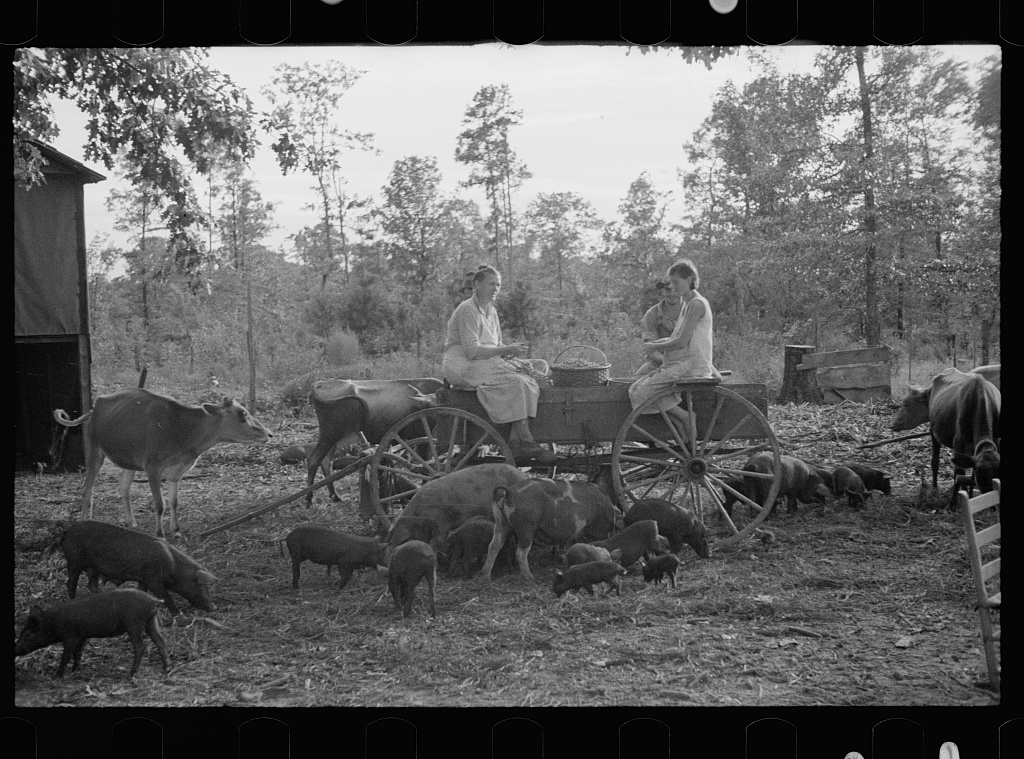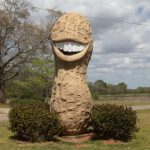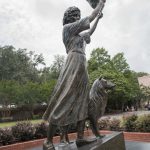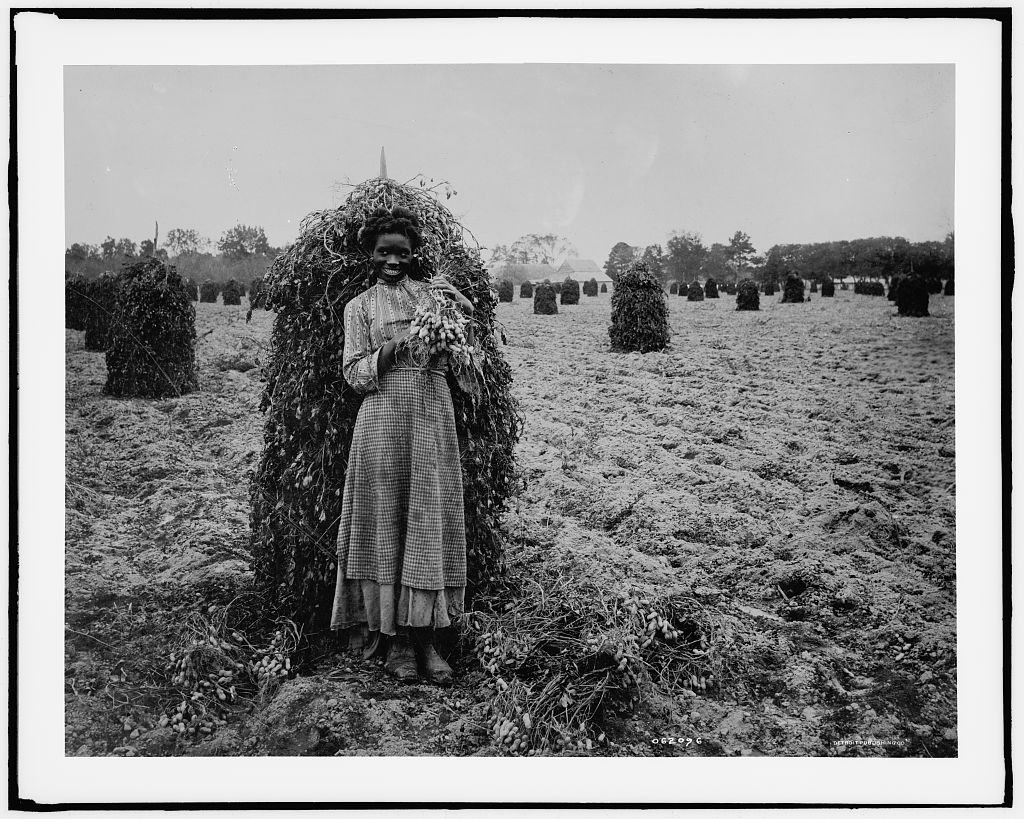From the July 16, 1870 issue of Harper’s Weekly:
PEA-NUTS.
OUR illustration on this page represents a scene which is perfectly familiar to those who have visited our Southern cities; and we dare say some of our readers who have sauntered along the Savannah docks may recognize the features of the good-natured and almost superannuated aunty whose bent figure, sheltered by the tattered umbrella, and surrounded by heaping baskets of roasted pea-nuts, forms the principle object in our picture. It was drawn from life, greatly to the delight of the old woman, who had never before been honored by the attentions of an artist.
The pea-nut, though almost universally liked, is considered very “ungenteel.” Its cheapness, and the ease with which the soft shell is broken, make it a favorite with boys; and it is rare indeed to empty a little fellow’s pocket and not find among its wonderfully miscellaneous contents two or three pea-nuts or the debris of their crumbling shells. Outside of boydom the popularity of the pea-nut is chiefly confined to people who frequent such places of amusement as the Bowery Theatre, the atmosphere of which is always redolent of the pea-nut stand and the beer gardens. Such people, indeed, munch them every where – as they walk the street, on the cars, in the stages, and aboard the ferry boats, scattering the shells abroad with the utmost indifference, and littering the dress of every person in their neighborhood. Pea-nuts impart a pungent odor to the breath, which makes the eater almost as great a nuisance in a crowd as one who indulges in the luxury of Limburger cheese.
In this city there are hundreds of stands where pea-nuts are sold, and the trade in them must be very large, if not particularly remunerative. There must be several hundred old men and old women in New York alone who make their living at these stands – their entire sales consisting, on any day, of a few shillings worth of pea-nuts, with perhaps a dozen or two apples, whose surface shines with a polish too suggestive of the process by which it is obtained for delicate stomachs. Occasionally you may see a gentleman purchasing at these stands; but generally it is done with a furtive glance to see that nobody is near whose observation might be unpleasant. If one like pea-nuts, and is thus sensitive, it is convenient to have the protection of a little son or nephew, who may not, however, in all cases reap the benefit of the purchase.
The pea-nut is not recognized in polite society. It is not found at dessert. Yet a few years ago an American in Munich placed on the dinner-table of the Hôtel de Bavière a dish of these with other nuts peculiar to this continent, for the benefit of his German friends, and the unanimous verdict of the foreign members of the party was, that the pea-nut was most excellent eating. Thus pea-nuts, like prophets, are not without honor save in their own country; and it is not likely they will ever rise above their present position here.
When I read this piece I thought of a book I read years ago (I don’t have the reference). The author referred to hamburger (and maybe potatoes) as an inferior food or inferior good. That kind of surprised me – what about McDonald’s?
I’m not sure about peanuts. I don’t think adults try to hide their use of them. You might never be able to order peanuts as a main course in hotels in Bavaria or any other place, but 150 years later peanuts do seem to be a highly valued food. Peanut butter and jelly sandwiches might not have the same cachet as other entrees, but they have a good deal of nutritional value. As scientists have analyzed food in greater and greater detail, we now know that peanut butter is kind of high in fat, but it has 0 cholesterol and 0 trans fat. And that’s a good thing, at least for now. [September 8, 2020: For example, the September 5th 2020 issue of The Economist (page 8) mentions that up to 240 million people around the world have food allergies and peanut allergy is the most common, although thanks to science, there is now an approved remedy.]
Peanuts were one of the crops that George Washington Carver, an earlier scientist, urged farmers to grow to offset the ravages of King Cotton:
“While a professor at Tuskegee Institute, Carver developed techniques to improve soils depleted by repeated plantings of cotton. He wanted poor farmers to grow other crops, such as peanuts and sweet potatoes, as a source of their own food and to improve their quality of life. The most popular of his 44 practical bulletins for farmers contained 105 food recipes using peanuts. Although he spent years developing and promoting numerous products made from peanuts, none became commercially successful.” Rotating cotton with crops that returned nitrogen to the soil, for example sweet potatoes and legumes such as peanuts, would improve the soil.
In his 1917 How to grow the peanut : and 105 ways of preparing it for human consumption George Washington Carver saw a bright future for peanuts:
“By reason of its superior food value the peanut has become almost
a universal diet for man, and when we learn its real value, I think
I am perfectly safe in the assertion that it will not only become a
prime essential in every well-balanced dietary, but a real necessity.
Indeed, I do not know of any one vegetable that has such a wide range
of food possibilities.”
_________________________________
Life isn’t always as peaceful as that snapshot of the peanut vendor at the Savannah docks. On December 22, 1869 General Alfred Howe Terry began serving as “the last military governor of the Third Military District, based in Atlanta.” According to the January 1, 1870 issue of Harper’s Weekly even before that he had reported that the Klu Klux Klan was still active in the state. The newspaper editorialized:
MURDER AND SENTIMENTALITY.
A FEW weeks ago, while the Boston Cadets were feasting General MAGRUDER, the rebel commander at Great Bethel, Union men in Georgia, according to General TERRY, were murdered at the pleasure of the Ku Klux hands. There is, he says, no security for life or property, and magistrates neither will nor can do justice. Do the worthy members of the Company of Cadets see no relation between the two facts? Their invitation to General MAGRUDER does not, indeed, directly occasion the slaughter of Union men; but it does indirectly. The lesson which the disaffected element in the Southern States is so painfully slow to learn is that we understand our own victory, not as one of vengeance, but of principle. And how can we ever expect them to learn it if we do not show it in every intelligible way? General MAGRUDER threw up the commission of his country to fight against his flag, at the command of a State, for the purpose of perpetuating human slavery. Is this an act which the Boston Cadets think worthy of especial honor? Or is it to show that they have no ill feeling? But nobody charged it upon them. Or is done because they think that General MAGRUDER was as honest as they were?
… we would not certainly honor conspicuous rebels while the rebel spirit slaughtered our brethren …
… There is this advantage in the councils of extreme men, as they are called – that they understand each other. Set a thief, if you choose, to stop a thief. Fight fire with fire. These are exhortations that grow out of the depths of experience. It may not be an agreeable truth, but it is a truth, that such a man as THADDEUS STEVENS understood better how to deal with rebels than any more moderate man; and for the reason that he was of a like resolution and temper with them, but patriotically and nobly directed. The policy of reconstruction which has been adopted was the result of a situation which Mr. STEVENS, and men like him instinctively divined. When he spoke of confiscation and military rule and territorial condition, there was a general shuddering even among his own party friends. He was vigorously denounced as blood-thirsty and vindictive by the opposition. But he always quietly answered in substance, why is the blood of enemies more precious than that of friends?
He did not indeed advise bloodshed. But he was of the opinion that the blood of rebels should be spilled rather that of Union men of any color. He knew, also, that it was necessary, by a thorough and radical reorganization of society in the rebel States, to show the rebel spirit that the country fully comprehended its own victory, and would certainly secure it. He knew that the contempt of “the North” was ingrained and traditional in the South,” and that the shortest and surest way of peace was to show a perfect readiness upon the part of “the North” to use its superior strength to establish its policy.
His view of the situation was correct. It implied nothing vindictive, nothing unjust. Gradually events showed its wisdom. … [events including massacres, Black Codes, and the Ku Klux Klan] …
That condition virtually remains. Nobody, of course, expects that any system will instantly pacify a State so long demoralized by the barbarism of slavery, and then so riven with Civil War as Georgia. But because every thing may not be done at once, it would be extremely foolish to endeavor to do nothing. The removal of the colored members of the Legislature was a deliberate defiance of the authority of the United States. Had it been instantly accepted as such by Congress, and the territorial condition been restored, there would be at this moment much more security for life and property in that State than General TERRY reports. So, likewise, when it was proposed that the Cadets in Boston should honor General MAGRUDER, magistrates and juries in Georgia would have been stronger had the Cadets decisively declined.
The remedy is, first of all, moral, then physical. Let the South perceive that we regard the war as a very sober matter – as an enormous crime, the memories and lessons of which are not to be drowned in a slop of sentimentality. Then the leaders will act accordingly; and if not now, then in the next generation. It is a very great mistake that we can not wait. Experience proves that we can. Then the immediate remedy is physical. It is a disgrace to the country that it suffers such a condition of things any where in its domain as that reported by General TERRY. If it is proved that Georgia does not protect lives and property, let the United States protect them by any necessary number of soldiers, and for any length of time whatever.
According to the New Georgia Encyclopedia General Terry took some action soon after he took over:
“In June 1869 in White v. Clements, the Supreme Court of Georgia ruled two-to-one that blacks did indeed have a constitutional right to hold office in Georgia. Ironically, one of the two deciding justices was Chief Justice Joseph E. Brown, appointed by Bullock in July 1868. In January 1870, Alfred H. Terry, the third and final commanding general of the District of Georgia, conducted “Terry’s Purge.” He removed the General Assembly’s ex-Confederates, replaced them with the Republican runners-up, and then reinstated the expelled black legislators, thus creating a heavy Republican majority in the legislature. In February 1870 the newly constituted legislature ratified the Fifteenth Amendment and chose new senators to send to Washington. The following July, Georgia was again readmitted to the Union.”
I think I remember years ago reading a quote from George Washington Carver about peanuts. I’m not sure if this is it or not:
When I was young, I said to God, ‘God, tell me the mystery of the universe.’ But God answered, ‘That knowledge is for me alone.’ So I said, ‘God, tell me the mystery of the peanut.’ Then God said, ‘Well George, that’s more nearly your size.’ And he told me.
When I was young, I said to God, ‘God, tell me the mystery of the universe.’ But God answered, ‘That knowledge is for me alone.’ So I said, ‘God, tell me the mystery of the peanut.’ Then God said, ‘Well George, that’s more nearly your size.’ And he told me.
You can read that and many more interesting quotes from Mr. Carver at AZ Quotes

